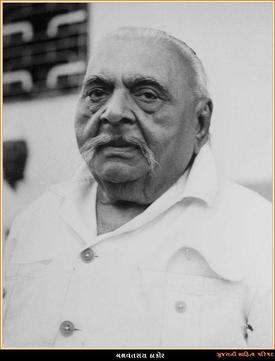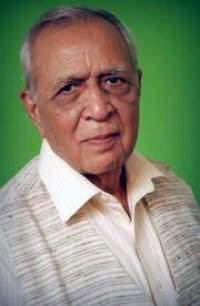Related Research Articles
The history of Gujarati literature may be traced to 1000 AD, and this literature has flourished since then to the present. It is unique in having almost no patronage from a ruling dynasty, other than its composers.

Umashankar Jethalal Joshi was an Indian poet, scholar and writer known for his contributions to Gujarati literature. He wrote most of his works in Gujarati.

Narmadashankar Lalshankar Dave, popularly known as Narmad, was an Indian Gujarati-language poet, playwright, essayist, orator, lexicographer and reformer under the British Raj. He is considered to be the founder of modern Gujarati literature. After studying in Bombay, he stopped serving as a teacher to live by writing. During his prolific career, he introduced many literary forms in Gujarati. He faced economic struggles but proved himself as a dedicated reformer, speaking loudly against religious and social orthodoxy. His essays, poems, plays and prose were published in several collections. His Mari Hakikat, the first autobiography in Gujarati, was published posthumously. His poem Jai Jai Garavi Gujarat is now the state anthem of Gujarat state of India.

Nanalal Dalpatram Kavi was an Indian writer and poet in Gujarati language of Gujarati literature. His name is sometimes spelled as Nhanalal.

Balwantray Kalyanray Thakore, popularly known as B. K. Thakore, was a poetry teacher and one of the great pioneers of the Pandit yug, during the turn of the twentieth century period in Gujarati literature. Known as 'Ballukaka' in his intimate circle, he played a key role in the development of modern Gujarati poetry.

Chandravadan Chimanlal Mehta, popularly known as C. C. Mehta or Chan. Chi. Mehta, was a Gujarati playwright, theatre critic, bibliographer, poet, story writer, autobiographer, travel writer and broadcaster from Vadodara, Gujarat, India.
Swami Anand was a monk, a Gandhian activist and a Gujarati writer from India. He was the manager of Gandhi's publications such as Navajivan and Young India and inspired Gandhi to write his autobiography, The Story of My Experiments with Truth. He wrote sketches, memoir, biographies, philosophy, travelogues and translated some works.

Bholabhai Patel was an Indian Gujarati author. He taught numerous languages at Gujarat University and did comparative studies of literature in different languages. He translated extensively and wrote essays and travelogues. He was awarded the Padma Shri in 2008.
Muni Jinvijayji was a scholar of orientalism, archeology, indology and Jainism from India.

Ramanlal Jethalal Joshi was Gujarati language literary critic and editor from India. He studied and later taught at Gujarat University in Ahmedabad. He served at several literary and educational institutions. He edited, authored and published criticism in more than forty-two books. He was awarded the Sahitya Akademi award in 1984.

Ramnarayan Vishwanath Pathak was a Gujarati poet and writer from India. Profoundly influenced by Gandhian thought, Pathak wrote criticism, poetry, drama, metrics and short stories. He edited and translated literary works. He was appointed the president of Gujarati Sahitya Parishad in 1946. He was awarded the Gujarati literary prizes Narmad Suvarna Chandrak for Prachin Gujarati Chhando in 1949 and Sahitya Akademi Award for Bruhat Pingal in 1956.

Jayant Gokaldas Gadit was a Gujarati novelist, critic and professor from Gujarat, India. He received the Dhanji Kanji Gandhi Suvarna Chandrak in 2008 and was awarded the Gujarat Sahitya Akademi prize twice.
Rasiklal Chhotalal Parikh (1897–1982) was a 20th-century Gujarati poet, playwright, literary critic, Indologist, historian, and editor from Gujarat, India. He was the president of Gujarat Sahitya Sabha and was appointed the president of Gujarati Sahitya Parishad in 1964. He received the Sahitya Akademi Award in 1960 for his play Sharvilak. He is also a recipient of the Ranjitram Suvarna Chandrak and the Narmad Suvarna Chandrak.

Tridip Suhrud is an Indian writer, political scientist, cultural historian and translator from Gujarat, India.
Hariprasad Gangashankar Shastri was an Indian scholar, historian, epigraphist, Indologist and editor primarily known for his work on the political and cultural history of Gujarat state. He spent much of his career at the B. J. Institute of Learning and Research, Ahmedabad, as a lecturer, professor, deputy director and then as director.

Sharda Mehta was an Indian social worker, proponent of women's education, and a Gujarati writer. Born to a family of social reformers, she was one of the first two women graduates in the modern-day Gujarat state of India. She established institutes for women's education and women's welfare. She wrote several essays and an autobiography as well as translated some works.

Sudarshan Gadyawali is a 1909 collection of prose writings by Gujarati writer Manilal Dwivedi (1858–1898), which appeared in his journals Priyamvada and Sudarshan from 1885 to 1898. It contains essays on a broad range of subjects, including religion, ethics, social reform, education, politics, nationalism, theosophy, women's welfare, Eastern and Western philosophy, music, and literature, in addition to a number of book reviews.

Amar Asha is a Gujarati poem by Manilal Dwivedi. It was his last poetic work – published posthumously in the 1898 issue of his own magazine, Sudarshan. Described as Manilal's most important work and cited as one of the most popular poems in Gujarati literature, Amar Asha has been studied and interpreted by several writers since its publication.
Vishwanath Maganlal Bhatt was a Gujarati literary critic and lexicographer from Gujarat, India. He had published 22 works. He was awarded the Ranjitram Suvarna Chandrak in 1935.

Rao Bahadur Hargovinddas Dwarkadas Kantawala was an Indian Gujarati language writer, editor and researcher from British India. He is known for his research and editing works on medieval Gujarati literature. He was the president of the sixth session of the Gujarati Sahitya Parishad.
References
- 1 2 3 4 Mohan Lal (1992). Encyclopaedia of Indian Literature: sasay to zorgot. Sahitya Akademi. p. 3967. ISBN 978-81-260-1221-3.
- 1 2 Jan Peter Schouten (2008). Jesus as Guru: The Image of Christ Among Hindus and Christians in India. Rodopi. p. 134. ISBN 978-90-420-2443-4.
- 1 2 3 "પહેલો ગુજરાતી વાર્તાકાર શામળ ગોમતીપુરનો રહેવાસી હતો (English: The first Gujarati story teller Samal was from Gomtipur)". Navgujarat Samay (in Gujarati). 2 March 2014. Archived from the original on 4 March 2016. Retrieved 29 August 2014.
- 1 2 Umedbhai M. Maniar (1969). The Influence of English on Gujarati Poetry. Faculty of Arts, M. S. University of Baroda. pp. 26–27.
- ↑ Ghose, Sankar (January 1991). Mahatma Gandhi. Allied Publishers. ISBN 9788170232056.
- ↑ Rajmohan Gandhi (9 October 2007). Mohandas: True Story of a Man, His People. Penguin Books Limited. pp. 22–. ISBN 978-81-8475-317-2.